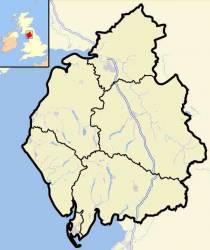 Cumbria, UK – Wikimedia Commons image
Cumbria, UK – Wikimedia Commons imageEven as the United States tries to decide whether to make good on a commitment last February to implement enhanced Loran (eLoran), agencies and private companies in the United Kingdom are demonstrating leadership in the field of modernized positioning, navigation, and timing (PNT) services.
Even as the United States tries to decide whether to make good on a commitment last February to implement enhanced Loran (eLoran), agencies and private companies in the United Kingdom are demonstrating leadership in the field of modernized positioning, navigation, and timing (PNT) services.
Two recent project awards underline: a £4-million contract by the General Lighthouse Authorities (GLAs) to upgrade and enhance 14 differential GPS reference stations in the UK and Ireland and a £2.2 million (US$3.25 million) grant from the government-sponsored Technology Strategy Board to certify the performance of GPS, the eLoran and Russia’s GLONASS.
The GLA’s new DGPS contract with VT Communications follows on the May 2007 award of a 15-year contract to the company for the provision of a state-of-the-art eLoran navigation service from its radio communications facility in Cumbria, UK.
Commenting on the award on behalf of the GLA, Jeremy de Halpert, executive chairman of Trinity House, said, “VT Communications submitted the tender that most closely matched all the requirements for the supply, installation, and commissioning of a robust DGPS service we seek to provide for all mariners navigating the UK and Irish coastlines. It is a tribute to the company’s expertise and its understanding of the unusual environment the GLAs operate in that they have been awarded this contract within 18 months of successfully bidding for the eLoran contract.”
Meanwhile, a business and academic consortium led by Chronos Technology, based in Lydbrook, Gloucestershire, has received the Technology Strategy Board grant to support a 30-month GNSS Availability, Accuracy, Reliability anD Integrity Assessment for Timing and Navigation (GAARDIAN) project. This initiative seeks to improve the safety and security of location-based applications such as marine navigation and road transportation.
GAARDIAN will use the UTC-traceable timing signal from the GLAs’ eLoran station established by VT Communications at Anthorn, Cumbria, along with analysis of the GPS signal data to authenticate GPS reception wherever it is needed for mission and safety critical applications.
Enhanced Loran — a modernized, upgraded generation of the LOnge-RAnge Navigation system developed after World War II — complements GNSS technology, allowing users to retain the benefits of electronic PNT services through an independent system when satellite signals are disrupted.
In the United States, eLoran had been recommended by an Independent Assessment Team (IAT) report in late 2007 to serve as a back-up to GPS. The Fiscal Year 2009 (FY09) U.S. budget added language “migrating” the LORAN-C system from the U.S. Coast Guard (USCG) to the Department of Homeland Security’s (DHS’s) National Protection and Programs Directorate (NPPD) as a first step toward providing back-up capability for critical infrastructure that depends on GPS for position, navigation and timing.
Following that decision, Ursa Navigation Solutions (UrsaNav) announced an alliance with Nautel to provide full-service eLoran solutions, including systems engineering, integration, and follow-on support. Nautel (Bangor, Maine, and Hackett’s Cove, Nova Scotia, Canada) will continue to concentrate on developing eLoran transmitter systems. Other manufacturers are also bringing new eLoran/GPS user equipment to market.
Recently, however, DHS officials have signaled continued reluctance to actually carrying out that plan. Discussion are reportedly taking place among deputy secretaries of defense, homeland security, and transportation to resolve the issue in time to complete the 2008 version of the Federal Radionavigation Plan.





